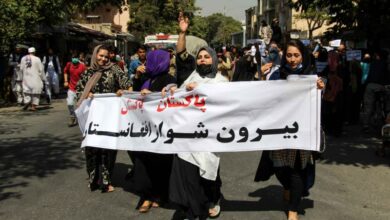Cuba calm after regime thwarts plans for big protest march

Havana, Nov 16 (EFE).- The hangover from the planned anti-government march that was thwarted by a massive deployment of Cuban security forces earlier this week, is engulfing a country where polarization and political, economic and social issues that were the causes of the quashed protest remain just as present.
The Cuban government, which did not authorize the march, derailed the protest called by the opposition with an unusually large police deployment in the country’s major cities, staging government-sponsored “repudiation rallies” and arresting numerous opposition members while blockading other activists and independent journalists in their homes.
In response, the Archipielago group, which had organized the march for political change in Cuba, accused the government of violating the public’s fundamental rights and proposed prolonging any protests until Nov. 27.
The collective argued that “the causes that motivated the calling of the 15N (protest) still prevail” and the government “has not gotten the message,” and so it is insisting that the mobilization continue.
The call by the group, which lobbies for peaceful discussion of political change and the release of political prisoners, has been to continue using the color white as the mark of the anti-government stance, keeping the issue alive on the social networks and staging a “cacerolazo” – a public protest where people bang on pots and pans – at 9 pm every evening.
The legal non-governmental organization Cubalex confirmed that the Cuban regime either arrested, forced to remain in their homes or sent government supporters to harass with so-called “acts of repudiation” at least 77 people.
One of the acts of repudiation that gained the most widespread notice was in the central city of Santa Clara, where well-known anti-government activist Saily Gonzalez was beset by several dozen people shouting slogans, as shown in a video that she posted to the social networks.
The arrests of opposition figures such as Democratic Transition in Cuba vice president Manuel Cuesta Morua, Ladies in White leader Berta Soler and her husband Angel Mora, among others, also have been widely denounced.
Other activists have complained on the social networks that they were subjected to house arrest starting on the weekend, as in the case of journalists Abraham Jimenez Enoa and Luz Escobar.
Amid this scenario, not all of the half dozen journalists working in Cuba for Agencia EFE, Spain’s international news agency, have had their press credentials restored, despite widespread reaction rejecting Havana’s move by foreign governments and international organizations.
Cuban authorities on Saturday, a few hours prior to the scheduled start of the 15N (Nov. 15) protests, withdrew the press credentials from all Agencia EFE personnel on the communist island without explaining why or clarifying whether this was a temporary or permanent measure.
A few hours later, the authorities restored the credentials to two of the six journalists on the Agencia EFE team, something that agency president Gabriela Cañas, said was “insufficient,” demanding that the other four sets of credentials be restored.
In a far cry from the images last July 11, when the biggest anti-government protests in more than two decades erupted in Havana, the Cuban capital was calm on Nov. 15.
EFE was able to verify that the streets of Havana were especially calm after 3 pm on Monday, when the marches were supposed to kick off seeking political change on the communist-ruled island.
The police presence on the streets in downtown Havana was much greater than normal and in local parks and on street corners plainclothes state security agents were much in evidence, and businesses, schools and public transport seemed to be operating normally.
Many government buildings were covered with huge Cuban flags and officials of government ministries held assorted events in their offices to reaffirm their support for the regime, and in other spots recreational activities were sponsored that attracted large numbers of people, albeit virtually no white-clad protesters.
In fact, the public in general avoided wearing white clothing, aware of the connotations it might have for security forces and the possible repercussions that might ensue.
When thousands of people took to the streets in July, they did so in a country where basic products and food were scarce, long lines formed at almost any sales outlet and inflation was out of control.
And that is the same scenario that spurred organizers to call for the 15N marches around the country, which the government declared “illegal,” claiming that it was sponsored by the US and the “enemies of the Revolution” with an eye toward fostering “regime change.”
Cuban Foreign Minister Bruno Rodriguez spoke in a Facebook transmission of a “failed operation” by the United States to sell an “unrealistic image” of his country, emphasizing the “festivities and joy” around the country on the same data on which schools reopened and international tourism resumed after a lengthy lockdown due to the coronavirus pandemic.





